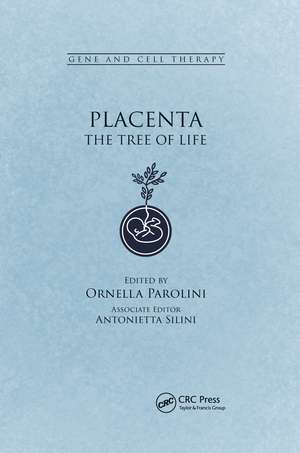Placenta: The Tree of Life: Gene and Cell Therapy
Editat de Ornella Parolinien Limba Engleză Paperback – 30 mar 2021
Emphasizing the potential research and therapeutic use of stem cells, the book discusses the development, structure, and functions of the human placenta. It introduces overall aspects of the immune system, explains some of the immune mechanisms during pregnancy, and shows the role of the placenta in these mechanisms. Current scientific research is presented that focuses on the mechanisms of action underlying the therapeutic benefit of cells isolated from different placental regions.
An exhaustive examination, this pivotal work:
- Considers how perinatal cells may represent an important source for cell therapy approaches in the near future, in both human and veterinary medicine
- Describes the clinical potential of placenta-derived cells in regenerative medicine—specifically in neurological disorders, metabolic liver diseases, inflammatory diseases, and autoimmune diseases
- Explains how cells isolated from different placental tissues share basic properties
Placenta: The Tree of Life summarizes the advantages of perinatal tissue as a source of cells with therapeutic potential and is designed for use in the study of genetics, stem cell science, placental function, reproductive biology, regenerative medicine, and related fields.
Preț: 436.18 lei
Nou
Puncte Express: 654
Preț estimativ în valută:
83.47€ • 86.83$ • 68.91£
83.47€ • 86.83$ • 68.91£
Carte tipărită la comandă
Livrare economică 12-26 aprilie
Preluare comenzi: 021 569.72.76
Specificații
ISBN-13: 9780367658618
ISBN-10: 0367658615
Pagini: 312
Dimensiuni: 156 x 234 x 18 mm
Greutate: 0.45 kg
Ediția:1
Editura: CRC Press
Colecția CRC Press
Seria Gene and Cell Therapy
ISBN-10: 0367658615
Pagini: 312
Dimensiuni: 156 x 234 x 18 mm
Greutate: 0.45 kg
Ediția:1
Editura: CRC Press
Colecția CRC Press
Seria Gene and Cell Therapy
Cuprins
Structure and Development of the Human Placenta. The Role of Mesenchymal Stem Cells in the Functions and Pathologies of the Human Placenta. The Roles of the Human Placenta in Fetal-Maternal Tolerance. The Human Placenta in Wound Healing: Historical and Current Approaches. Cell Populations Isolated from Amnion, Chorion, and Wharton’s Jelly of Human Placenta. The Immunomodulatory Features of Mesenchymal Stromal Cells Derived from Wharton’s Jelly, Amniotic Membrane, and Chorionic Villi: In Vitro and In Vivo Data. Use of Placenta-Derived Cells in Neurological Disorders. Use of Amnion Epithelial Cells in Metabolic Liver Disorders. The Use of Placenta-Derived Cells in Autoimmune Disorders. The Use of Placenta-Derived Cells in Inflammatory and Fibrotic Disorders. From Bench to Bedside: Strategy, Regulations, and Good Manufacturing Practice Procedures. Applications of Placenta-Derived Cells in Veterinary Medicine.
Notă biografică
Ornella Parolini is founder and Director of Centro di Ricerca E.Menni, Fondazione Poliambulanza, a research center focused on placental stem cells and their potential therapeutic applications. Dr. Parolini and her team have pioneered the concept that the placenta harbors stem cells with unique immunomodulatory properties that are at the basis of the mechanisms promoting tissue regeneration after their transplantation. In 2009, Dr. Parolini was nominated as the first President of the International Placenta Stem Cell Society for her scholarly contributions and networking efforts in this field and was re-elected in 2014. She is author of over 120 publications in peer-reviewed journals and has several patents in the placenta stem cell field.
Antonietta R. Silini obtained her bachelor of science in microbiology from the University of Maryland, College Park, and PhD degree in life sciences from the Mario Negri Institute for Pharmacological Research, Milan, Italy, in collaboration with the Open University of London, UK. Her past research interests include cancer biology. Her current research interests include investigating placental stem cells and their potential therapeutic effects on different diseases, including cancer. Dr. Silini works at the Centro di Ricerca E.Menni, Fondazione Poliambulanza, Brescia, Italy, which is internationally recognized for its research and contributions in this field.
Antonietta R. Silini obtained her bachelor of science in microbiology from the University of Maryland, College Park, and PhD degree in life sciences from the Mario Negri Institute for Pharmacological Research, Milan, Italy, in collaboration with the Open University of London, UK. Her past research interests include cancer biology. Her current research interests include investigating placental stem cells and their potential therapeutic effects on different diseases, including cancer. Dr. Silini works at the Centro di Ricerca E.Menni, Fondazione Poliambulanza, Brescia, Italy, which is internationally recognized for its research and contributions in this field.
Descriere
The placenta is a source of non-embryonic (i.e. not from the embryo or fetus) stem cells that can be used for research and potentially for a variety of therapies. Stem cells can be harvested following birth, thus avoiding some of the ethical/moral concerns. This book is devoted to the therapeutic and research potential uses for stem cells. It al







